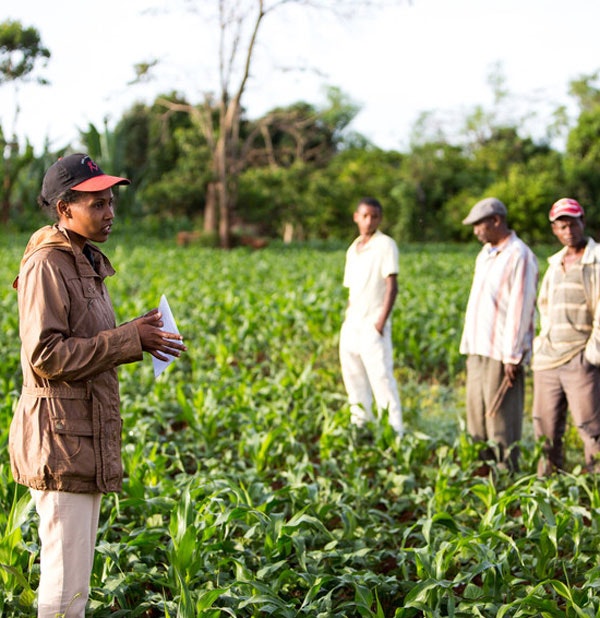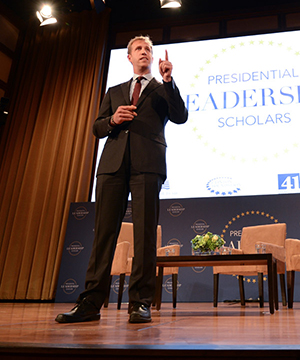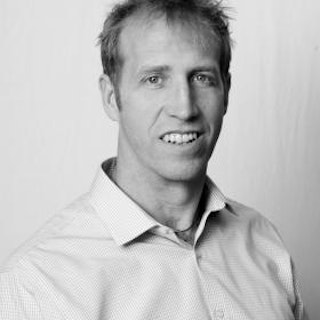Fighting Terrorism by Creating Economic Opportunity
As a Marine on the ground in Iraq, Jake Harriman saw men and women acting on behalf of extremists because they had no other means of supporting their families. Now out of the military, the Presidential Leadership Scholar is taking steps to bring opportunity to remote villages in Africa.
 Jake Harriman, U.S. Marine Corps platoon commander, in Iraq. (Courtesy Jake Harriman)
Jake Harriman, U.S. Marine Corps platoon commander, in Iraq. (Courtesy Jake Harriman)
In April 2003, I found myself in a fighting hole facing north along Highway 7, the main avenue of advance for American forces during the Iraqi invasion. We had just survived the first major contact of the war in a place called Nasiriyah. Southern Iraq was a desperately poor region at the time. As American forces advanced north, Saddam Fedayeen had been pushing south, coercing poor farmers to fight the Americans by promising that they would feed their children if the farmer would pick up a weapon and fight the Americans.
That morning on Highway 7, I watched as Fedayeen soldiers murdered the family of one of these poor Iraqi farmers right before his eyes because he refused to fight the Americans, and I couldn’t save them. In two seconds, he lost his wife and two little girls. For the first time in the war, I put myself in his shoes. I thought to myself, I live in a world of choices, but what choices did this man have?
He could watch his children slowly starve, fight people he had never heard of, or attempt to escape with his family across our lines knowing that he would be killed if he were caught. He had no choices. As I stood next to that man holding his blood-soaked little girl, something awoke inside of me. It wasn’t fair that he had no choices just because of where he was born. I vowed to find a way to ensure that people could have real choices and hope where none previously existed.
What choices did this man have? He could watch his children slowly starve, fight people he had never heard of, or attempt to escape with his family across our lines knowing that he would be killed if he were caught.
A terrible lack of choices
During my time in combat, I spent countless days in these fragile, complex environments – doing my best to make a difference – to create lasting change. Sadly, I was not successful, and this repeated lack of success began to wear on me and those I served with.
I had seen a lot of horrific things in combat both before and after Highway 7, but my experience that day and countless other examples like it was witnessing a deeper kind of injustice that began to infuriate me. My teams and I started to talk about what we were seeing day-in and day-out in these remote, impoverished areas.
We talked about the terrible lack of choices these individuals had for really basic human rights and needs. Again and again, we saw the look of absolute desperation in the eyes of a young man or woman who would pick up a weapon they didn’t know how to use and try to fight us or plant a roadside bomb not knowing why they were doing it or what the device even was.
We began to see that many times these actions weren’t done out of some kind of blind hatred for the West, but out of love for that little three-year old daughter at home who was starving to death. We began to see that, although groups like the Taliban and Al Qaeda were horribly oppressive, they also performed basic development services in these remote areas – providing food, education, and jobs to desperate families that had no other viable alternatives.
Many times these actions weren’t done out of some kind of blind hatred for the West, but out of love for that little three-year old daughter at home who was starving to death. Although groups like the Taliban and Al Qaeda were horribly oppressive, they also … provid[ed] food, education, and jobs to desperate families.
This is a bit of an oversimplification, but within this complex space that my team and I were operating in, we observed two primary strategies being deployed to address the fragile state problem: military intervention and foreign aid.
We saw guys like us attempting to conduct Village Stabilization Operations as a path to success. But we were short-timers. Our time operating in these regions was usually less than a year, and furthermore, we were trained to take out targets – not help farmers increase crop yields.
We also saw brave aid workers conducting humanitarian assistance and disaster relief operations to provide immediate, short-term solutions attempting to alleviate the suffering in these war-torn, desperate populations. Courageous individuals who were routinely kidnapped or even killed as they carried out their work.
And even worse, there was very little if any coordination and collaboration between military and aid efforts. Instead of close coordinated planning and execution, both sides worked isolated within their own silos to try to help – furthering a culture of mistrust and misunderstanding that has crippled stabilization operations for decades.
A third way
We began to see a real gap in our national security strategy. We saw that there was a need for a third way – a hybrid of the military and aid strategies we were observing and participating in that would bridge the gap and give these farmers a viable alternative for providing lasting meaningful choices to their families. What if we could create a long-term sustainable community development solution for these fragile areas?
We began to see a real gap in our national security strategy. We saw that there was a need for a third way – a hybrid of the military and aid strategies … that would bridge the gap and give these farmers a viable alternative for providing lasting meaningful choices to their families.
What would a successful solution look like? What if we could create a solution that was eventually locally-led and locally-driven so that solutions would be owned and operated in the long run by the people best suited to solve the problems in that region? What if this solution could be funded by regional markets instead of philanthropy – contributing to a slowly-growing economy instead of distorting an already fragmented one?
What if this solution could be staffed by former combat operators who know how to handle themselves in chaotic, rapidly-changing, unsecure environments – operators who could live in these communities for long periods of time and act as catalysts to unlock the latent potential in local leaders – operators who are trained and experienced in building capacity and creating influence by, with, and through the local leaders they work with?
 Jake Harriman talking with Agriculture Program Field Manager James Magaigwa Chacha in Kenya. (Nuru International)
Jake Harriman talking with Agriculture Program Field Manager James Magaigwa Chacha in Kenya. (Nuru International)
In 2006, I left the Marine Corps on a quest to design and build this third way in an attempt to help bring a more holistic strategy to bear in the fight against violent extremism. I enrolled in the Stanford Graduate School of Business to build a company that could pilot and test a new way for development in highly-fragile regions around the world.
While at Stanford, I learned the power of design thinking, rapid prototyping, and iteration in creating breakthrough, innovative ideas in a market. Over 30 of my classmates and six faculty members got involved in helping me design the operating model and business plan.
I graduated in June 2008, and in September of that year, I moved to a remote impoverished corner of Kenya to launch the pilot program for what became known as Nuru International – a new, proactive development model to eradicate extreme poverty and help stabilize areas of conflict and fragility.
Testing the model
Over the last eight years, we have been building and testing our model. We have found that the key to long-term sustainability and success is unlocking the potential of local leaders. A strong Kenyan woman with the same knowledge and skill set that I possess is far more capable of creating lasting solutions to her community’s problems than I will ever be.
The key to long-term sustainability and success is unlocking the potential of local leaders. A strong Kenyan woman with the same knowledge and skill set that I possess is far more capable of creating lasting solutions to her community’s problems than I will ever be.
The key is just identifying and unlocking that potential in her. We equip local leaders with the skills they need to design highly-effective solutions that meet their communities’ most pressing needs, the tools to implement and scale those solutions efficiently, and the knowledge to innovate past challenges on their own as they arise.
After eight years in the field, I’m happy to announce that the model is working. Since we launched in 2008, we have grown to empower over 100,000 people permanently out of extreme poverty in Kenya and Ethiopia.
 Workers training each other in Hambisa, Ethiopia. (Nuru International)
Workers training each other in Hambisa, Ethiopia. (Nuru International)
We have created a completely Kenyan-led, Kenyan-owned organization that is scaling innovative, sustainable solutions co-created with local leaders. The solutions target root contributors to vulnerability and instability in deeply-impoverished communities of southwest Kenya.
They include sustainable agriculture programs that increase crop yields and link farmers to reliable markets; savings programs and mechanisms that enable families to cope with economic shocks; health worker programs that decrease the deaths of women and children under five years old; and education programs that increase literacy levels of children within the existing public school system.
Now that the model is working, we are ready to introduce it to a fragile state to fulfill that original vision I had for Nuru on Highway 7 in southern Iraq. One of the last remaining hold-outs of extreme poverty in our world today is highly-fragile states.
According to the Organization for Economic Co-operation and Development, 70% of all extreme poverty will be located in these states by 2030. Violent extremism is able to thrive and grow by exploiting the vulnerability of these remote, rural, ungoverned spaces.
According to the Organization for Economic Co-operation and Development, 70% of all extreme poverty will be located in [highly-fragile] states by 2030. Violent extremism is able to thrive and grow by exploiting the vulnerability of these remote, rural, ungoverned spaces.
Violent extremist groups exploit the desperation caused by extreme poverty in these areas to fuel their movements. These states are fertile ground for these groups to recruit, create logistics bases of support, and hide. To eradicate violent extremism, we must include a strategy that can eradicate extreme poverty in fragile, remote rural areas.
 Jake Harriman talking with neighborhood kids in Kenya. (Nuru International)
Jake Harriman talking with neighborhood kids in Kenya. (Nuru International)
The front in the war against violent extremism is increasingly moving to Africa. Al Qaeda was born in Afghanistan and Pakistan, but they are now moving to Kenya, Tanzania, Somalia, Uganda, Algeria, Mali, and Niger. ISIS was born in Syria and Northern Iraq but can now be found in Libya, Algeria, Egypt, and Nigeria.
It’s a race – we must get to vulnerable populations in remote, rural locations before the extremists do. We are competing with them. Desperate families are looking for someone – anyone – to present lasting, meaningful choices for survival and the possibility of a better future for their children.
At Nuru, we are getting ready to launch a project this year in northern Nigeria to help defeat Boko Haram, one of the deadliest extremist groups in existence today. We seek to change the national security conversation. Once we show through data that our model is working to disrupt Boko Haram, we want to offer it up as a new tool for the U.S. government’s national security toolbox – eventually to help take on violent extremism in all its forms around the world.
America has the greatest military in the world, but to win the war against violent extremism, we must lead the global community in proactive development efforts as we lead in military strength. By investing in these strategies, we can help defeat one of the greatest threats to humanity and make our nation and the world a safer, more secure place for future generations to come.
-
Previous Article The New Land of Opportunity An Conversation with Nachilala Nkombo, ONE's Interim Africa Executive Director
-
Next Article The Broader Importance of Foreign Aid An Essay by Holly Kuzmich, Executive Director of the George W. Bush Institute, and Senior Vice President of the George W. Bush Presidential Center


